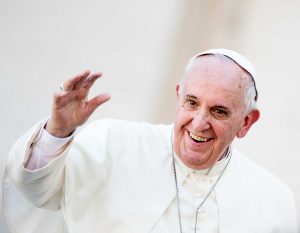By Edward Sheehan

This summer, yet another sexual abuse crisis broke out in the Catholic Church. Archbishop Carlo Mario Viganò, the former papal ambassador to the United States, released an inflammatory 11-page open letter to various conservative Catholic publications. In it, he accuses Pope Francis of covering for and abetting the decades of sexual abuse perpetrated against both minors and seminarians by Cardinal Theodore McCarrick.
According to Viganò, Pope Francis had lifted sanctions placed on McCarrick by Pope Benedict XVI, Francis’ predecessor, and given him a major role in the selection of new Cardinals. Viganò ended this salvo by demanding the Pope’s resignation. Although these accusations have led many to call for the Pope to step down, they’re not based in reality. Further, the Pope’s resignation would prove seriously damaging to the Catholic Church.
Many of the calls for Francis’ resignation are the product of internal church politics, rather than of any genuine concern the victims. In his 2017 article “The War Against Pope Francis,” The Guardian’s Andrew Brown discusses how the Pope’s push to open up Communion to some divorced individuals, to embrace refugees from various world conflicts and to oppose free-market capitalism has enraged conservative elements within the Curia, or the Vatican bureaucracy.
Perhaps even more divisive within the high reaches of the clergy has been Francis’ tireless work to reform the Curia. Francis has accused the group of devolving into a corrupt, out-of-touch body whose members spend more time gossiping and politicking than they do running the Church.
This two-front battle the Pope is fighting has left him with many opponents in the church, and Viganò himself is one of their number beyond a doubt.
Viganò has long been a controversial figure in the Vatican. According to The New York Times, he was appointed to a role akin to mayor of the Vatican in 2009 by Pope Benedict. There, Viganò surprisingly aligned with the reformist faction of the Church and was eventually shifted to the Nuncio in the United States. However, he was removed from this post after his decision to schedule a visit between Pope Francis and Kim Davis, the anti-gay marriage court clerk from Kentucky. It was a blatantly politicized decision – Davis was a cause to celebrate for the American Right – that brought disastrous publicity to the Pope at the zenith of his personal popularity.
Ever since his return to the Vatican, Viganò has increasingly aligned with hard-line social conservatives.
In his letter, Viganò lays bare his belief that a cabal of gay cardinals is to blame for the Church’s sexual abuse crisis and claims that Francis and his allies are at the core of this shadowy grouping. Furthermore, various publications have shown that the timeline of events Viganò lays out to support his accusations falls apart under scrutiny.
In fairness – given the rampant and pervasive nature of clerical abuse – there is a possibility that Francis had some knowledge. The question is, whether his opponents are able to solve this scourge on the faith.
I highly doubt it. The Pope’s opponents want to turn back the clock. They oppose secularism, ecumenicalism and modernism. Many of the cardinals at the core of the movement against Francis are opponents of Vatican II and wish to bring back things like the Latin Mass. Their only solution to the abuse crisis is claiming it is the result of a shady conspiracy. Regardless of whether these beliefs are theologically correct, they are unworkable in the modern, secular world.
If the Church becomes an organization devoted to standing athwart the course of history and yelling “stop,” most people will just ignore it. Francis is far from perfect, but his genuine commitment to engaging with the world as it is is promising. While he is a strong believer in orienting the Church more to the developing world – where the majority of Catholics now live – many of his opponents are proudly eurocentric.
If the Church is to survive, it must be willing to move forward with the times and engage with the crises of the 21st century. If it doubles down and rolls back the clock, it will become a weak, backwards shell of its former self. If Pope Francis resigns, it could condemn the church to a long descent further into irrelevance.
Edward Sheehan, FCRH ’22, is a history major from Needham, Massachussettes.




































































































































































































